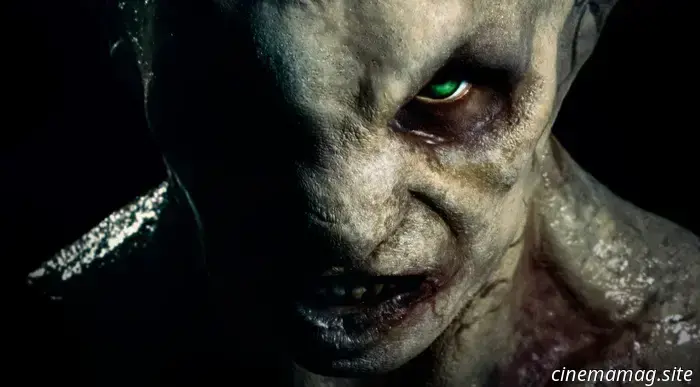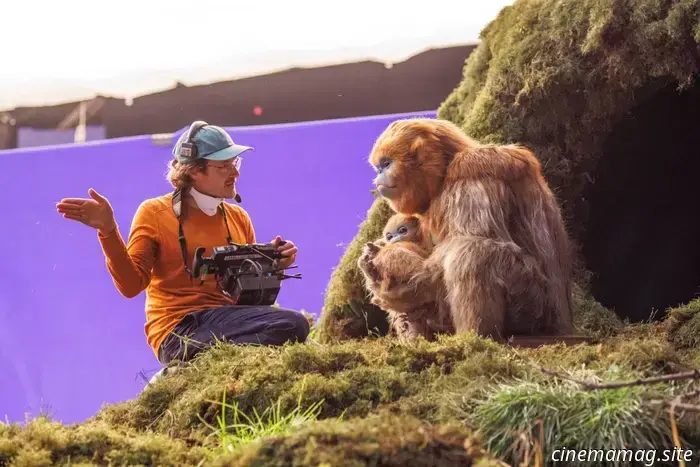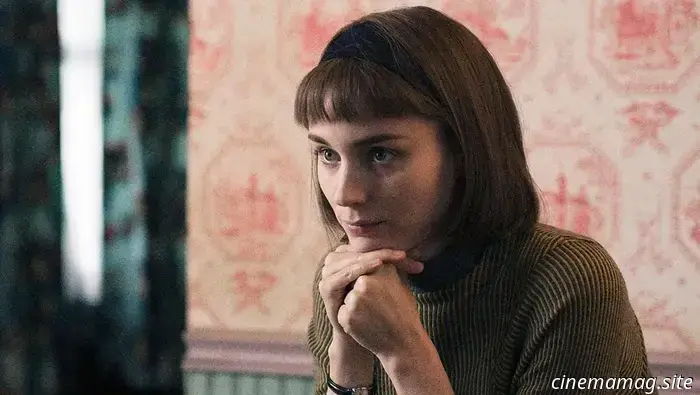
April Review: Dea Kulumbegashvili's Sophomore Film is a Mystical Cinematic Discovery.
Note: This review was initially published as part of our 2024 Venice coverage. April will be released in theaters on April 25.
Among this year’s varied lineup of competition titles at Venice, one film distinctly stands out. It is an original work without any predecessors or useful comparisons, a truly unique cinematic enigma: Dea Kulumbegashvili’s second feature, April. Following her two short films showcased at Cannes and her striking debut (2020’s Beginning) that captivated audiences at TIFF, San Sebastian, and NYFF, the Georgian filmmaker premiered her latest project on the Lido. The likelihood that taking the bold step of introducing something so refreshingly different will be successful is high. Not only does April stand out in this selection, but it also establishes Kulumbegashvili as a confident visionary who engages with complexity and radical ambiguity—essentially, a different kind of storyteller.
Similar to Beginning, April is marked by a mediated sense of reality. The director draws inspiration from fictionalized accounts rooted in real-life settings, particularly her hometown—a village nestled at the base of the Caucasus mountains in Georgia and its inhabitants. The minimal dialogue, prolonged takes, and a suffocating atmosphere of violence surrounding the protagonist—a Jehovah’s Witness pastor’s wife portrayed by the new film’s lead, Ia Sukhitashvili—create a dense ambiance in Beginning, while April allows for a more expansive breath. Arseni Khachaturan’s steady, almost insistently patient camera reveals a landscape that feels both familiar and disquieting: a world torn by a raging storm, gentle rain, a breathtaking sunset viewed from grass-level angles, and a decaying patriarchal structure that stifles female autonomy through its bodily politics. Nina (Sukhitashvili) is an OBGYN who, despite her best efforts, must report a newborn's death stemming from an undocumented pregnancy. Her patient’s husband demands an investigation, fully aware of allegations that Nina conducts illegal abortions in the village—an action that the patriarchal system cannot tolerate.
Nina’s commitment to her female patients is primarily conveyed through her resilience and her ongoing provision of secret consultations, contraception, and, indeed, abortions, all while jeopardizing her career and reputation. As a single woman no longer considered "young" by societal standards, she is an easy target; yet she persists. Her character deviates from the supportive, chatty doctor one might expect and exhibits unpredictability in various aspects. April intentionally encourages viewers to discard all preconceived notions and approach the film with fresh eyes—peeling back the layers of storytelling and character development until only the core remains, a core that defies articulation and must be experienced.
To convey this sensation, April employs elements as pure as heightened natural sounds, the passage of time, offscreen space, and a mysterious feminine figure that lingers at the edges of the frame from the very outset. Its breath is perceptible. The sharp gasps, shallow breaths, and troubled, pronounced exhales reverberate throughout, lending a sentient quality to the film. Even amidst its struggles—and our struggles alongside it—it undeniably possesses a vibrancy that is rare in cinema. If I were to speculate on why a film so elusive in narrative, imagery, and sound can feel so tangible and real, I would attribute it to its treatment of metaphor and the way it leverages cinematic techniques to avoid conventional metaphorical interpretations of expected imagery. Elements like the aforementioned female figure or the unfolding storm that stretches on for minutes invite a form of mediated interpretation—a story waiting to be revealed once symbolic codes are deciphered—but ultimately, there is nothing to decode. Dea Kulumbegashvili has discovered a means of deriving mystery from the literal, rather than translating it into metaphor—April's captivating nature is made possible because everything depicted is precisely as it appears, yet it transcends being merely that. However, it never becomes something different, as a metaphor or allegory would imply.
Beginning was produced by Carlos Reygadas, while April carries Luca Guadagnino’s name through his company Frenesy, but Kulumbegashvili doesn’t require such associations: her distinct filmmaking speaks for itself. Indeed, it communicates, but the director’s aversion to conventional cinematic language (or any linguistic, semantic, or discursive shortcuts) is evident in her reinvention.
April premiered at the 2024 Venice Film Festival.

Other articles
 12 Dangerous Animal Films That Featured Real Animals — With Different Levels of Success
These films featuring dangerous animals aimed for realism, and the outcomes were frequently quite frightening.
12 Dangerous Animal Films That Featured Real Animals — With Different Levels of Success
These films featuring dangerous animals aimed for realism, and the outcomes were frequently quite frightening.
 The indie werewolf horror film First Moon has released a trailer and poster.
One Tree Entertainment has unveiled a poster and trailer for First Moon, a werewolf horror film by writer-director Peter McLeod. The story follows a young woman who is frantically attempting to flee from the religious cult that has taken her captive. The film features Lauren Esposito, Julian Curtis, and Shannon Ryan. Watch the trailer below… A young waitress is kidnapped [...]
The indie werewolf horror film First Moon has released a trailer and poster.
One Tree Entertainment has unveiled a poster and trailer for First Moon, a werewolf horror film by writer-director Peter McLeod. The story follows a young woman who is frantically attempting to flee from the religious cult that has taken her captive. The film features Lauren Esposito, Julian Curtis, and Shannon Ryan. Watch the trailer below… A young waitress is kidnapped [...]
 Ernie Hudson takes on the role of Combat Carl in Toy Story 5.
With the Toy Story franchise moving forward with a fifth installment, production aimed to find a replacement for one of its key characters following the death of Carl Weathers. Deadline has confirmed that Ernie Hudson will step in for the late actor. Hudson, widely recognized for his role in Ghostbusters, has also appeared in […]
Ernie Hudson takes on the role of Combat Carl in Toy Story 5.
With the Toy Story franchise moving forward with a fifth installment, production aimed to find a replacement for one of its key characters following the death of Carl Weathers. Deadline has confirmed that Ernie Hudson will step in for the late actor. Hudson, widely recognized for his role in Ghostbusters, has also appeared in […]
 “There's No Nostalgia for Me in This Film”: Director Isaiah Saxon Discusses How He Made His $10 Million Debut, The Legend of Ochi, Feel Larger Than Life.
Producing films is a challenging endeavor. This may not be a groundbreaking statement, but a movie like The Legend of Ochi emphasizes how often we overlook the complexities of filmmaking. Crafting immersive worlds and unforgettable narratives entails a significant amount of incredible skill. As I mentioned in my review, “The
“There's No Nostalgia for Me in This Film”: Director Isaiah Saxon Discusses How He Made His $10 Million Debut, The Legend of Ochi, Feel Larger Than Life.
Producing films is a challenging endeavor. This may not be a groundbreaking statement, but a movie like The Legend of Ochi emphasizes how often we overlook the complexities of filmmaking. Crafting immersive worlds and unforgettable narratives entails a significant amount of incredible skill. As I mentioned in my review, “The
-Movie-Review.jpg) The Friend (2024) - Film Review
The Friend, 2024. Written and directed by Scott McGehee and David Siegel. Featuring Naomi Watts, Bill Murray, Ann Dowd, Constance Wu, Sarah Pidgeon, Carla Gugino, Noma Dumezweni, Felix Solis, Owen Teague, Bing, Gina Costigan, Josh Pais, Annie Fox, Carrie Vu, Sue Jean Kim, Sarah Baskin, Jess Gabor, Juliet Brett, Seth Barrish, Ian Lithgow, Afsheen Misaghi, […]
The Friend (2024) - Film Review
The Friend, 2024. Written and directed by Scott McGehee and David Siegel. Featuring Naomi Watts, Bill Murray, Ann Dowd, Constance Wu, Sarah Pidgeon, Carla Gugino, Noma Dumezweni, Felix Solis, Owen Teague, Bing, Gina Costigan, Josh Pais, Annie Fox, Carrie Vu, Sue Jean Kim, Sarah Baskin, Jess Gabor, Juliet Brett, Seth Barrish, Ian Lithgow, Afsheen Misaghi, […]
 MUBI’s lineup for May 2025 features Rooney Mara, Amalia Ulman, highlights from Latin America at Cannes, and more.
MUBI's lineup for May 2025 is here, showcasing a double feature starring Rooney Mara, including what may be her finest film (Carol) alongside her latest work (La cocina), along with Latin American films selected for Cannes and a program curated by Amalia Ulman of Magic Farm. As Kent M. Wilhelm remarked in his review of Magic Farm, “I was convinced by the concept of mocking opportunistic”
MUBI’s lineup for May 2025 features Rooney Mara, Amalia Ulman, highlights from Latin America at Cannes, and more.
MUBI's lineup for May 2025 is here, showcasing a double feature starring Rooney Mara, including what may be her finest film (Carol) alongside her latest work (La cocina), along with Latin American films selected for Cannes and a program curated by Amalia Ulman of Magic Farm. As Kent M. Wilhelm remarked in his review of Magic Farm, “I was convinced by the concept of mocking opportunistic”
April Review: Dea Kulumbegashvili's Sophomore Film is a Mystical Cinematic Discovery.
Note: This review was first released as part of our coverage of the 2024 Venice Film Festival. "April" is set to be released in theaters on April 25. Among this year's varied selection of Venice competition films, one title distinctly shines. It is a movie that lacks any direct predecessors or relevant comparisons, serving as a unique instance of a cinematic mystery: Dea Kulumbegashvili’s second feature film.
